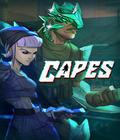The first Hellblade title followed Senua, a young woman who was suffering from mental illness and had been ostracized for it. After the death of her lover, she engages in a quest to bring him back from the dead, something that forces her to confront her own traumas and darkness. It was an extremely personal story that wasn't afraid to draw out emotions from the player. It also felt like a story that was difficult to follow. Senua's Saga: Hellblade II has a lot to live up to, but unfortunately, it doesn't quite hit the mark.
Hellblade II picks up sometime after Hellblade ended. Senua, having accepted the truth about herself, is now determined to live up to the promise she made to protect her people. The only way she can do this is by getting herself captured by the "Northmen," the raiders who kidnapped and slaughtered her people. Taken to their homeland as a slave, she finds herself thrown to the sea when a terrible storm wrecks her boat. Now lost in a strange land, she has to make unlikely allies with the very people she came to fight so she can find their leader and stop the slave trade once and for all. The task is made all the more difficult by the fact that Giants are roaming the land, destroying everything and everyone they come in contact with.
I was disappointed by Hellblade II. The first game was very personal and used Senua's history and issues as the basis for the plot; the supernatural elements felt like accents more so than anything else. Hellblade II brings things outside of Senua's head, but it ends up making things feel more disjointed. It makes everything feel a bit more "Hollywood," with Senua getting a generic band of followers and engaging in dramatic fights. In general, the game feels less distinct while still trying to be about Senua and her personality, so her followers get relatively little character screentime and very truncated arcs.
The end result is that I got kind of bored. There wasn't much to draw me in, aside from the gorgeous visuals and my fondness for the first game. The message of the game is delivered ham-fistedly, and several major plot beats fall flat because there's not enough time devoted to them to make them work. The ending is at once predictable and incredibly unsatisfying. Once you finish the game for the first time, you can unlock different narrators who further flesh out the story, but they basically involve going through the game again for brief snippets of lore.
Hellblade II feels like an unnecessary sequel. The first game stood alone so well and ended so perfectly, and the sequel feels like an attempt to force a story that didn't need to continue. There are gorgeous set pieces and beautiful visuals, but they feel in service to a story that feels unnecessary, and it isn't satisfying on its own merits either. It's not terrible, but it misses the same mark that the original Hellblade hit.
A good portion of that is that the gameplay feels like it has gotten simpler. The majority of Hellblade II is spent holding forward and listening to dialogue, which was a criticism of the first game, too. It's even truer here. Near the endgame, it feels like the game runs out of steam and begins rushing through plot points. There's one bizarre chapter where you enter haunted woods, and it seems like it is building up to something, only for it to be a major anticlimax.
Combat has been toned down. Fights in Hellblade II are all one-on-one fights, with your only combat options being a light attack, a heavy attack, a dodge and a parry. Combat itself is somewhat akin to Punch-Out. Enemies have specific moves, and you either dodge or parry and then counterattack. Most of the time, you can take down an enemy quickly just by dodging and then spamming a heavy attack. While fighting, you also build a focus meter, and when used, it slows down time and allows you to attack quickly when the enemy can't block. As long as you mash the button during focus attacks, you'll kill any enemy you face in a single focus flurry.
That's the extent of the combat. It's clearly designed around being more cinematic, with incredibly cool animations that regularly occur. Enemies sometimes get in between attacks, or you'll be ambushed from behind, and so on. That ends up making it feel like a QuickTime Event (QTE), with the cinematic flow of combat overriding actual gameplay. It looks amazing but isn't particularly engaging to play. I'm not sure if you can die in combat because any time I was knocked down, I could roll out of the way of the enemy's attack. Hellblade II does away with the corruption mechanic from the first game, but since that was a placebo anyway, it isn't a huge change.
Beyond that, there are some minor puzzles. You'll occasionally encounter a barrier that requires you to find "signs" in the environment to unlock. This is a pretty minor element, as there are perhaps five of these in the entire game, and the area where you need to stand is marked by thousands of glowing symbols, so it's easy to figure out. You also get the ability to "alter" the world by using bubbles of water, which make certain objects in the environment solid or phantasmal, requiring you to figure when and where to swap so you can reach certain areas.
There are some hidden collectibles in the environment. Looking for strange things in the environment, like rocks shaped like faces, can unlock hidden paths that lead to small bits of lore. Find enough, and you can even unlock a bonus narrator for a future playthrough. That's about it as far as extra content goes. I finished the entire game in roughly five-and-a-half hours, and some of that was spent searching for collectibles.
The one area I can't fault Hellblade II is presentation. It's a gorgeous game. The environments are stunning, the character models look fantastic, the combat animations flow together smoothly, and when the game gets into the supernatural, it can be jaw-dropping. It's probably one of the best-looking games on the Xbox Series X, and that's incredibly impressive from a smaller studio. There were times when I half-forgot I wasn't watching a movie.
The audio, especially the voice acting, also deserves a ton of credit. Senua's actress and the actresses playing the furies in her head, are carry a massive amount of the game, and they do so phenomenally well. The constant anxiety-inducing sound of Senua's inner voices does wonders to make otherwise dull segments drip with atmosphere, and Senua's screams of rage or sobs of despair are genuinely heartbreaking.
Senua's Saga: Hellblade II is a beautiful but ultimately hollow game. The fantastic presentation props up a story that is less personal and engaging than in the first game, and the gameplay feels like an afterthought. It was great to see Senua again and to see her outside of the grief-misery she was enveloped in during the first game, but beyond that, there's not much to Hellblade II. It's a short and less memorable experience that shows off Ninja Theory's visual craft to its fullest — but it achieves little else.
Score: 7.0/10
More articles about Senua's Saga: Hellblade II











 In Hellblade II, Senua returns in a brutal journey of survival through the myth and torment of Viking Iceland.
In Hellblade II, Senua returns in a brutal journey of survival through the myth and torment of Viking Iceland.












